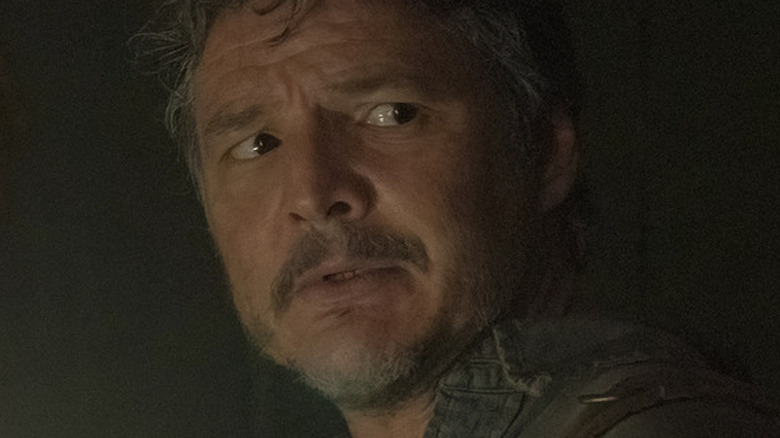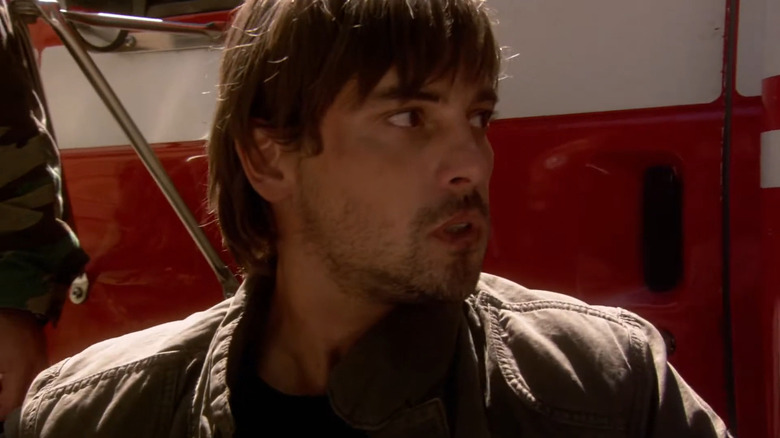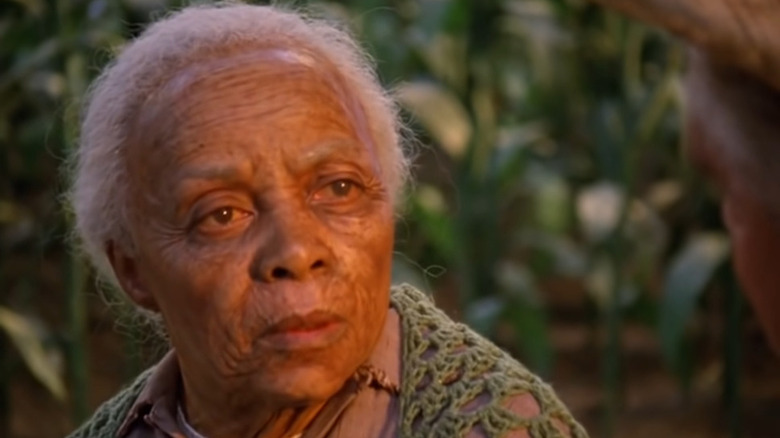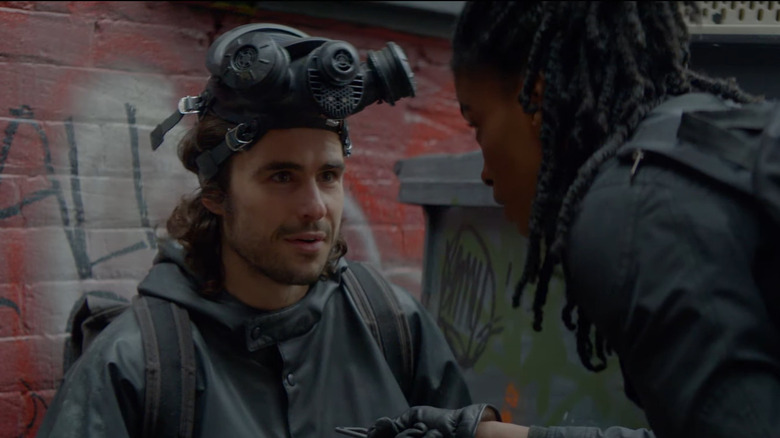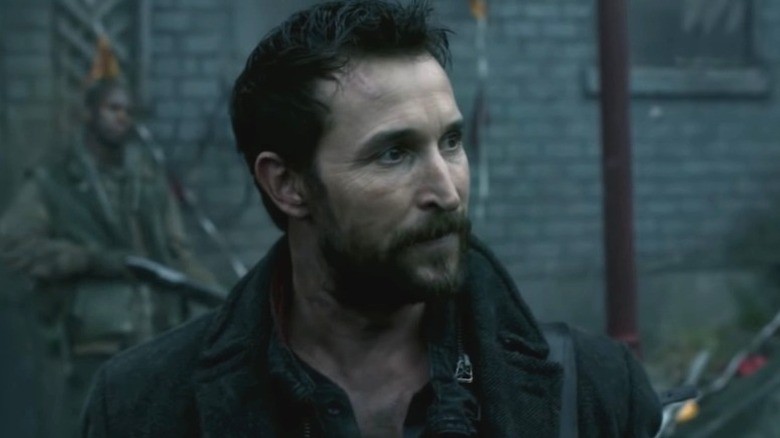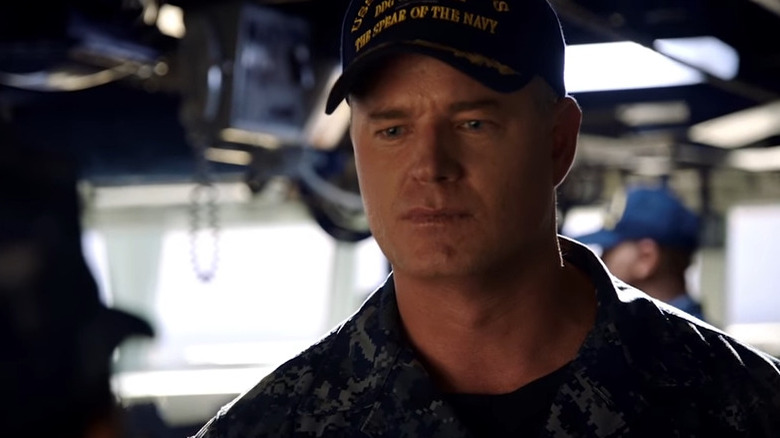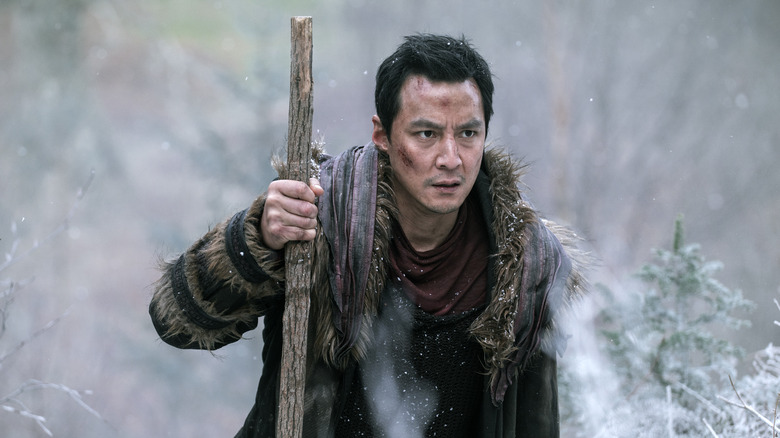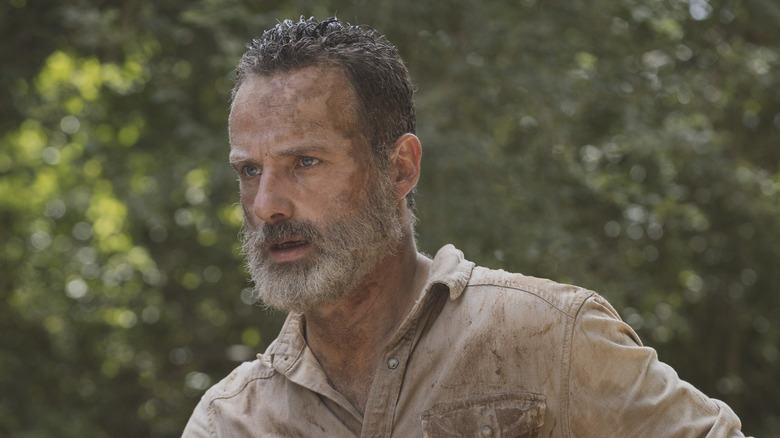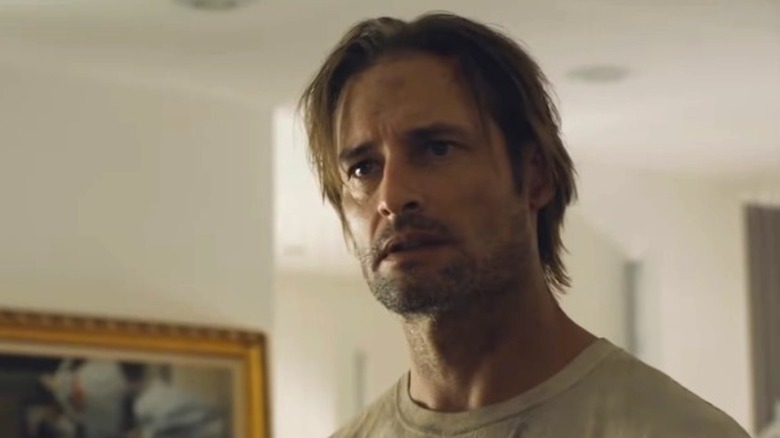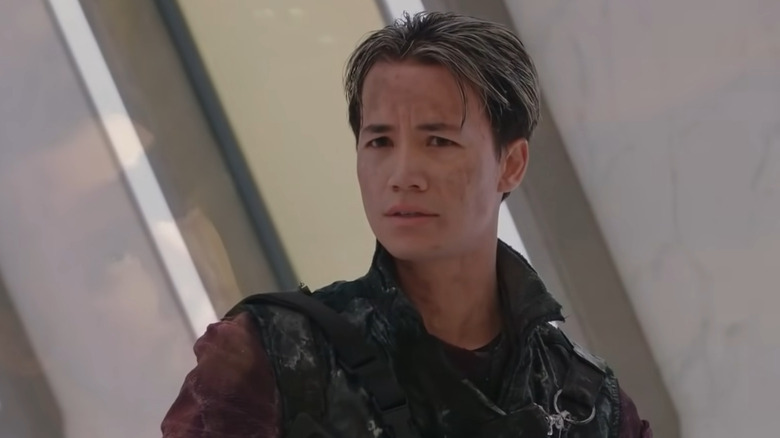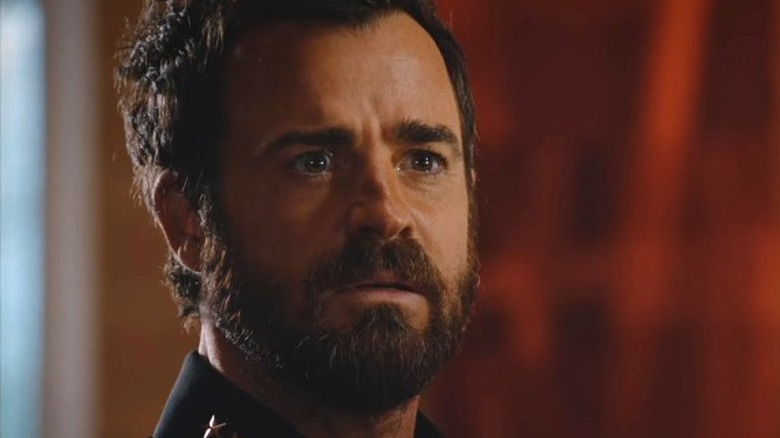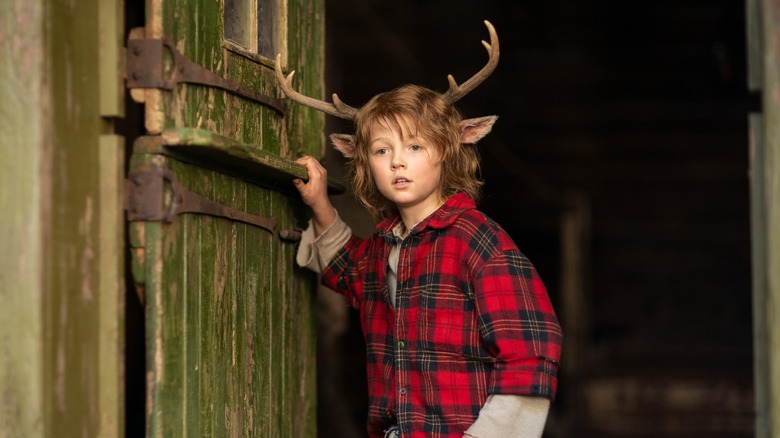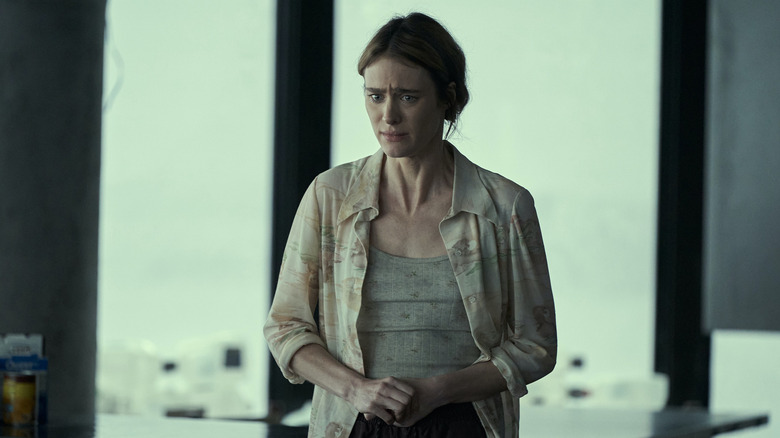12 Best Post Apocalypse TV Series Like The Last Of Us
Post-apocalyptic TV series are a very niche genre in the world of pop culture. Unlike dystopian-heavy video game series like "Fallout" or film franchises like "Mad Max," there are comparatively fewer TV shows set amidst a global apocalypse than there are movies and video games. However, that's not to say certain post-apocalyptic shows out there aren't worthy of your time, with several dystopian series having been released over the years that remain supremely entertaining in their own right.
Most notable among these shows is the upcoming arrival of "The Last of Us," the HBO adaptation of the hit PlayStation series of the same name. After a fungal infection ravages mankind's population and leaves civilization in ruins, a hardened survivor named Joel (Pedro Pascal) reluctantly agrees to accompany a young teenager, Ellie (Bella Ramsey), across the country.
The success of the "The Last of Us"' video games can't be understated; the series received several major awards and won significant acclaim from critics and players alike. With HBO's adaptation set to air in mid-January, we'll have to wait and see if the show manages to recapture the same aspects that made the video game popular in the first place, namely an emphasis on storytelling, immersive environments, and complex characters. In the meantime, there are numerous post-apocalyptic TV shows to watch in anticipation, many of which bear similarities to "The Last of Us" in some form or another.
Jericho
Set in the small Kansas town, "Jericho" follows a close-knit community as they struggle to survive in the wake of a nuclear war. Cut off from neighboring towns and with limited resources to sustain themselves, the town's residents try to create a makeshift civilization using what little tools they have, eventually coming into contact with the outside world.
A beloved post-apocalyptic series with a massive cult following behind it, the fact that "Jericho" was temporarily brought back from cancellation owing to fan support is evidence of the show's above-par quality. Included in TV Guide's list of the Top Cult Shows Ever, it received a comic book continuation to effectively wrap up the series, providing an epilogue for its characters following its final cancellation in 2008.
The similarities between "The Last of Us" and "Jericho" can be mostly attributed to their respective post-apocalyptic settings. Like "The Last of Us," "Jericho" sees a dystopian world where civilization on a massive scale has ended, but clusters of society continue to exist. In such a barren world, the characters of each series are required to make difficult choices for the sake of their survival, sometimes to the point of performing barbaric acts. There's also a degree of factional fighting between various groups in both TV series, with the main characters of "Jericho" finding themselves amidst a second Civil War, while the Fireflies battle a totalitarian police state in "The Last of Us."
The Stand
To be clear, the 1994 adaptation of Stephen King's seminal novel, "The Stand," has its fair share of weaknesses. But at the very least, it's much better than that horrendous 2020 miniseries that was released on Paramount+. Like the 1990 Tim Curry-led adaptation of "It" also, the most apparent flaws in "The Stand" are its dated effects and some minor pacing issues. Yet it still manages to craft an effortlessly engaging miniseries that remains intrinsically true to King's original novel.
After a lethal government-manufactured super flu is accidentally released, 99.4% of the world's population succumbs to the virus. With only a handful of people left in the U.S., the survivors band together in two different factions: one led by the angelic Mother Abigail (Ruby Dee) and the other led by the demonic Randall Flagg (Jamey Sheridan).
As you can expect from a Stephen King adaptation, "The Stand" can be more closely aligned with the supernatural undertones of "Lost" than the more gritty realism of "The Last of Us." Regardless, both shows revolve around the idea of a mysterious virus running rampant in the world, with society left in shambles after the infection has killed off most of humankind. In terms of the survivors traveling long distances to their settlements in Las Vegas and Boulder, Colorado, too, there is a definite road trip quality to "The Stand" reminiscent of Joel and Ellie's own arduous odyssey in "The Last of Us."
Y: The Last Man
A series years in the making that was canceled far too soon, "Y: The Last Man" is the FX on Hulu adaptation of Brian K. Vaughan and Pia Guerra's absolutely brilliant comic book series of the same name. When a mysterious cataclysmic event wipes out every lifeform with a Y chromosome on Earth, the only surviving male, Yorick Brown (Ben Schnetzer), and his pet capuchin monkey venture through the dystopian landscape.
Don't let the fact that "Y: The Last Man" was canceled after a single season fool you. The inaugural season of this vastly underrated series earned mostly positive reviews, making its abrupt cancellation a bit mind-boggling, to say the least. Admittedly, it does open to a slow start, dragging its feet in regards to its central storyline, but it quickly picks up enough momentum to read in a meaningful, exciting conclusion. Time's Judy Berman perhaps put it best, writing, "'Y: The Last Man' improves so much over the course of its first six episodes that its potential feels limitless."
In terms of its connection to "The Last of Us," certain ties can be found between the two shows' road trip style approach, both of which see their respective main characters embarking on a fateful, long-winded journey to save mankind. After all, Ellie's immunity to the Cordyceps is extraordinarily similar to Yorick's apparent immunity to the event that killed every other male on the planet.
Falling Skies
One of the flagship TNT series of the 2010s, "Falling Skies" is a fresh and hard-edged take on the traditional alien invasion genre. Set after a malevolent alien race has destroyed most of the world's population, the few remaining survivors form resistance pockets across the globe. First, their primary goal is to defend themselves against the extraterrestrial onslaught, only later gaining enough momentum to bring the fight to their invaders.
Enjoying a healthy five-season run on cable, "Falling Skies" aired to generally positive reviews from most critics, RogerEbert.com's Ian Grey calling it, "terrific, a smart, overwhelmingly emotional one of a kind." Ending on a high point rather than overstaying its welcome (like some other entries on this list), it's an entertaining post-apocalyptic war series that harkens back to executive producer's Steven Spielberg best sci-fi films ("Close Encounters of the Third Kind" and "War of the Worlds," specifically).
Like "The Last of Us," viewers can expect to see a post-apocalyptic society struggling to piece itself together. With humanity fighting their alien invaders by the skin of their teeth, the "us vs. them" mentality of "The Last of Us" can be directly tied to humanity's battle against the infected in the upcoming HBO series. But even more than that is the idea of ordinary people — whether it's Joel in "The Last of Us" or Tom (Noah Wyle) in "Falling Skies" — hardening to their perilous new environments, becoming unexpected heroes forced to make bold choices.
The Last Ship
The genius of TNT's "The Last Ship" is its simplicity. After a major viral illness wipes out 80% of the world's population, a lone U.S. Navy vessel with a crew of 218 people tries to find a safe port to re-establish society. Comprising five seasons, some episodes of "The Last Ship" can be a bit slow, featuring the Navy ship cruising along while some internal conflict threatens to splinter the crew's solidarity. But for the most part, it's an exciting enough drama series with an intriguing hypothetical scenario at its center.
In essence, the premise seems extraordinarily similar to the 1959 underrated post-apocalyptic classic, "On the Beach." Far less grim than its original counterpart, "The Last Ship" follows several brave people as they contribute to mankind's efforts to survive, resolving to find a cure capable of saving humanity. From that description alone, the show seems to directly align with Joel and Ellie's own attempt to locate a cure capable of battling the Cordyceps virus in "The Last of Us."
Similar to "The Last of Us," the show's main character, Commander Tom Chandler (Eric Dane), is a regular man reluctantly thrust into a heroic position. While contending with the mental and emotional trauma of losing his loved ones on land, Chandler nevertheless embodies a leadership role, rallying his crew to save mankind. In "The Last of Us," Joel may never have been an actual leader, but his rise to the occasion directly parallels Chandler in "The Last Ship."
Into the Badlands
One of the more original and fully-formed post-apocalyptic series on this list, the strongest feature of "Into the Badlands" is its well-thought-out fictional universe. Airing on AMC from 2015 to 2019, "Into the Badlands" depicts a dystopian future that mixes elements from "Mad Max," Spaghetti Westerns, and classic martial arts movies. The cocktail of genres helps to define it as a very different kind of show on AMC, even if it never reaches its ultimate potential.
Five centuries into the future, large-scale wars have broken down large-scale civilizations. To fill the void left by modern society, feudal lords have seized power over most of the U.S., ruling territorial lands through power, intimidation, and elite warriors referred to as "clippers." Meeting a mysterious young man (Aramis Knight) from beyond these Badlands, a skilled clipper (Daniel Wu) teams up with the teen to find a more peaceful place free from violence and bloodshed.
With its futuristic post-apocalyptic setting, it's difficult to compare "Into the Badlands" with the more grounded narrative of "The Last of Us." However, both shows do revolve around a deadly anti-hero trying to escape his past (Pascal's Joel and Wu's Sunny), forming a new existence for himself and for the sake of his loved ones. The relationship between Wu's clipper and Knight's teenager is also comparable with Joel and Ellie in "The Last of Us," their mutually hostile travels eventually growing into budding familiarity and affection between the two.
The Walking Dead
Following the premiere of "The Walking Dead" on AMC in 2010, the show became a pop culture phenomenon. Basking in enthusiastic reviews from critics and fans, the popularity of its first seasons was comparable to the mass viewership and acclaim won by "Game of Thrones." Waking up from a coma, Georgia lawman Rick Grimes (Andrew Lincoln) is shocked to learn the world has become infested with ravenous zombies. Returning to his wife (Sarah Wayne Callies) and son (Chandler Riggs), Rick and his family adapt to their post-apocalyptic surroundings, joining various other people they come across to survive.
The most glaringly obvious similarity between "The Last of Us" and "The Walking Dead" is the fact that both shows are set in the midst of a widespread zombie apocalypse (although the infected creatures in "The Last of Us" are never referred to as such). Aside from that, viewers can see overlapping themes woven into the nature of each show, "The Walking Dead" embodying many of the same ideas as "The Last of Us."
Like HBO's upcoming series, "The Walking Dead" shows a group of survivors slowly losing touch with their humanity, sacrificing their morality in order to withstand the unforgiving landscape they find themselves in. Over time, however, they manage to rediscover their long-dormant emotions, bonding with their fellow survivors and realizing there's more to life than simply surviving, mirroring Joel's arch to a T.
Colony
Following the conclusion of "Lost" in 2010, showrunner Carlton Cuse and star Josh Holloway teamed up for another project in 2016. Set in a near-distant future, "Colony" takes place after a hostile alien species have arrived on Earth, taking over the planet and installing a human collaborationist government to oversee life on the planet. Small contingents of people stand up to the new totalitarian regime — among them a government worker acting as a mole (Holloway) and his wife (Sarah Wayne Callies) who secretly works for the resistance.
Designed by Cuse to be an allegory for France's Vichy government during World War II (per Collider), "Colony" poses some very profound questions: What would the world look like if an alien-devised regime took over the world? What would life be like under such a tyrannical faction? And most importantly, what part would you play in this futuristic setting — would you aid the government, the resistance, or simply do your best to mind your own business?
In many ways, this sort of harsh dystopian setting is not unlike the authoritarian groups we see in "The Last of Us." Struggling to keep populations in check, these governments have suspended civil liberties and enforced martial law, punishing and suppressing the people they were once sworn to protect. In the center of it all is a middle-aged father figure struggling to eke out a living at the cost of his own morals.
The 100
The CW has aired many worthwhile TV shows in the past, from popular superhero series to lesser-known shows frequently overshadowed by the ardent fandoms of "Arrow" and "The Flash." A great example of this can be found in "The 100," a wonderful post-apocalyptic series that ran on The CW for seven seasons.
Nearly a century after a nuclear war has ravaged most of Earth's surface, humanity's survivors dwell on a spacecraft known as the Ark, orbiting the planet in the hopes of one day returning to their home world. With their supplies dwindling, the Ark sends one hundred juvenile delinquents down to Earth to see if the planet is safe enough to re-establish society. Before very long, the group quickly realizes they're not alone, coming into contact with native populations who survived the war.
Containing clear shades of "Lord of the Flies," "The 100" examines the foundations of civilization at the most basic levels, with mankind forced to start over again from the very beginning. Tense, exciting, and filled with factional fighting and power struggles between groups, it can be most accurately described as a post-apocalyptic version of "Game of Thrones" in the best way imaginable.
As with many of the entries on this list, the biggest similarity between "The 100" and "The Last of Us" is their dystopian settings. Along with that, however, is the heavy emphasis placed on unified groups of survivors who remain together for survival, killing off anyone and everyone outside of their individual group.
The Leftovers
Before "The Last of Us," HBO ventured into the post-apocalyptic genre with shows like "Station Eleven" and "The Leftovers" — the latter having gone on to secure cult status within years of its release in the mid-2010s. Created by award-winning showrunner Damon Lindelof, "The Leftovers" is set in a world where 2% of the world's population (about 140 million people) randomly disappears without a trace in an event called the "Sudden Departure."
As the world adjusts to this disappearance, existential questions are raised which leads to the emergence of several powerful cults including one in the small town of Mapleton, New York. Referred to as one of the greatest TV shows of its era by outlets like Rolling Stone and The Guardian, "The Leftovers" is an ambitious series that explores themes like organized religion, family, and carrying on in the wake of a life-altering critical upheaval.
While its strange dystopian future isn't nearly as barbaric as the one portrayed in "The Last of Us," there are some elements in "The Leftovers" that do tie into HBO's upcoming series. For example, the focus on its individual characters and their changing perspectives as they come to terms with the bizarre environments around them is practically identical in each show. After all, at their most fundamental levels, both show heavily emphasize how much their protagonists' viewpoints and attitudes are altered with time, as well as how they deal with life as the world changes underneath their feet.
Sweet Tooth
Comic book writer Jeff Lemire might be more well-known for his grounded original stories like the "Essex County Trilogy," but when he veers into genre territory, he's capable of crafting stories that manage to affect readers just as deeply. Case in point with Lemire's comic book and its later Netflix adaptation, "Sweet Tooth." Previously described as "'Mad Max' meets 'Bambi,'" "Sweet Tooth is a unique story of innocence in the face of a worldwide disaster, as well as about growing up in an incredibly hostile environment.
A decade ago, a mysterious event known as "The Great Crumble" killed off most of the world's population and led to the arrival of a human-animal hybrid species. Raised by his father in the woods his whole life, a nine-year-old deer-human hybrid (Christian Convery) sets out to find his mother, accompanied by his reluctant protector (Nonso Anozie).
From that synopsis alone, a clear parallel can be drawn between "Sweet Tooth" and "The Last of Us." Set against the backdrop of a world ravaged by an enigmatic sickness, a world-weary father figure agrees to watch over a younger protagonist whose innocent outlook on life is slowly depleted. Focusing on themes such as adoptive families and relying on love and friendship in lieu of survival alone, both shows offer a more humanistic portrayal of the apocalypse. Of course, "Sweet Tooth" may be the more magical and realistic of the two, but both do an admirable job presenting weighty themes in their dystopian futures.
Station Eleven
Along with "The Leftovers," "Station Eleven" is the other major post-apocalyptic series in HBO's recent history. Adapted from Emily St. John Mandel's celebrated novel of the same name, "Station Eleven" is set 20 years after a massive flu has decimated the planet, leaving only small bands of survivors populating the world. Among these survivors is a theatrical performing troupe, which soon encounters a malevolent cult whose leader (Daniel Zovatto) has ties to one of the troupe's core members (Mackenzie Davis).
A miniseries as dark, brooding, and foreboding as its source material, "Station Eleven" is one of the most awe-inspiring series to air on HBO Max. Nominated for numerous awards – including the Primetime Emmy Award for outstanding writing for a limited or anthology series or movie — "Station Eleven" earned repeated praise for its originality, performances, and writing. Al Horner of Empire Magazine called the show "an achievement of the tallest order, full of tenderness, experimentalism and captivating design."
Once again, the post-apocalyptic settings of "Station Eleven" closely align it with the world of "The Last of Us." However, there is also a more psychological aspect to "The Last of Us" that bears plenty of similarities to "Station Eleven." In both shows, the characters often meet and interact with other survivors whose intentions remain unclear. Are they fellow survivors who mean no harm and simply doing their best to survive, or do they harbor more sinister intentions toward each show's protagonists?
